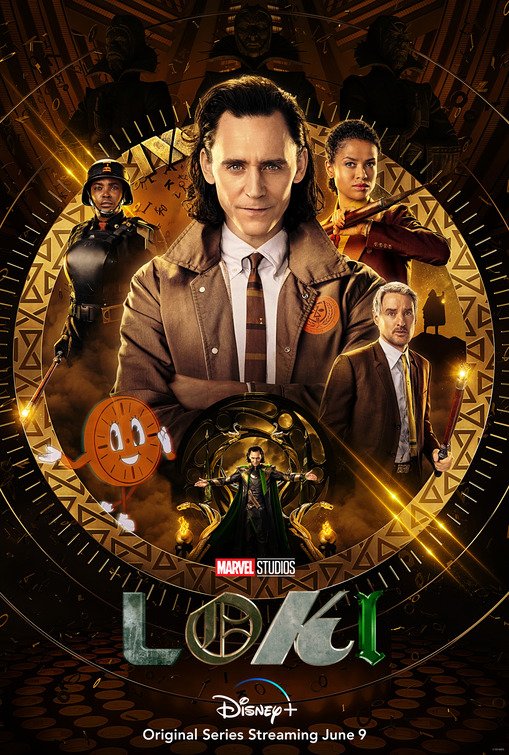“Lively, Funny Adventure Explores Interesting Philosophical, Moral Questions”

| None | Light | Moderate | Heavy | |
|---|---|---|---|---|
| Language | ||||
| Violence | ||||
| Sex | ||||
| Nudity |
What You Need To Know:
LOKI’s first two episodes are a lot of fun. They’re funny, satirical, whimsical, witty, lively, and playful. Surprisingly, there are even some stimulating philosophical conversations about free will, time and the nature of good and evil. Also, Mobius gets Loki to admit he’s a morally flawed person with a lust for power. MOVIEGUIDE® advises caution for older children due to four obscenities and one light profanity over 103 minutes and some humanist elements and brief questionable philosophy in the first two LOKI episodes.
Content:
Light humanist worldview supports the belief in a multiverse, a belief that’s been used by atheists to eliminate the need for a God or religion, but the first two episodes don’t focus on this, though they do create a fictional Time Variance Authority created by three mysterious, powerful, god-like, “all-knowing” beings who control the Authority to protect the “sacred timeline” of all the multiverses, with some strong moral, light redemptive elements where the Time Variance Authority is trying to stop an apparent villain from creating chaos for some nefarious purpose (the villain has killed some of the Authority’s time soldiers/enforcers aka “minutemen”), some brief discussion about purpose, and one continuing character gets the morally challenged title character to admit his moral flaws (whether that confession will get him to change is another question), but the continuing character says at one point, “I can’t offer you salvation, but maybe I can offer you something better” (it’s implied that the something better is a chance to do good and stop a villain) and says at another point, “No one bad is truly bad, and no one good is actually truly good,” a statement that seems a little ambivalent about the biblical doctrine of sin or immorality, plus the title character refers to himself as a god and calls himself “the God of Mischief” (also, the title character views his advanced technology as a form of “magic,” but the use of the term is an ironic allusion to science fiction author Arthur C. Clarke’s idea that any advanced technology will seem like “magic” to other people, especially someone from a lesser advanced culture)
Two obscenities (one “h” word and one “d” word) in Episode 1.1 and two “d” obscenities and one OMG profanity in Episode 1.2
Some strong and light action violence such as ray guns are used to make people die by disintegrating (not gruesome, however), the title character is threatened with execution, the title character is arrested and restrained by soldiers, the mysterious villain in the first two episodes sets fire to a field filled with seeping oil which starts to burn two time soldiers to death and hurts another time soldier who tries to crawl away, and there’s some other fighting with the mysterious villain
No sex
Upper male nudity in Episode 1.1 when title character is arrested and forced to strip and put on a prison uniform
No alcohol use
No smoking or drugs; and,
Title character lies repeatedly and steals a powerful device, title character has stolen some money and jumps out of a passenger airplane to escape, and title character is exposed as a person capable of killing and exposing people to danger without caring, but his behavior is implicitly rebuked.
More Detail:
The first episode begins with the scene from the movie AVENGERS: ENDGAME, where Loki, played by Tom Hiddleston, makes off with the Tesseract device and leaves the main timestream. He’s immediately picked up by soldiers from the Time Variance Authority (TVA) and whisked away to their headquarters. A TVA agent named Mobius, played by Owen Wilson, gives him an ultimatum. Be completely erased from Reality for disrupting the “Sacred Timeline,” or help him stop a rogue “time variant” whose actions could end in an uncontrollable multiversal war or too many time paradoxes that could destroy Reality. Mobius reveals that the rogue time variant he’s chasing is suspected of being another version of Loki, with the same ability to shapeshift and create illusions. Loki promises to play along with Mobius and help Mobius catch the criminal, but it becomes clear that Loki wants to overthrow the three powerful “all-knowing” Time Keepers who run the TVA so that he himself can control the whole of Time and Reality. In the second episode, they try to catch the other version of Loki at a couple past events as the relationship between Loki and Mobius takes some new developments and new twists.
The first two episodes of LOKI are a lot of fun. They are funny, satirical, whimsical, witty, lively, and playful. There are many funny lines and crazy situations. Tom Hiddleston and Owen Wilson are both great, as is the rest of the cast. Hopefully, the series can maintain this high level and the same pace of wit, humor, action, and roller coaster twists and turns.
Unexpectedly, the script contains some stimulating philosophical conversations about the existence of free will, the nature of good and evil, and other subjects. There’s even an in-depth look at Loki’s mercurial, malevolent affinity for mercenary mischief. While being interrogated by Mobius, for example, Loki denies he likes hurting people, even though Mobius shows Loki that Loki enjoyed killing Agent Coulson in the original AVENGERS movie. Loki tries to avoid the psychological analysis of Loki’s flawed character by Mobius. Eventually, however, Mobius gets Loki to admit he’s a morally flawed person with a lust for power. He gets Loki to confess, “I don’t like hurting people. I don’t enjoy it. I do it because I’ve had to. Because it’s part of the illusion. It’s the cruel, elaborate trick conjured by the weak to inspire fear.” The last sentence of Loki’s confession is something that Mobius accused Loki of doing. Mobius then quotes the rest of his accusation against Loki in their previous discussions. “A desperate plea for control,” he adds. “You do know yourself,” Mobius concludes.
In the dialogue of the nature of good and evil, Mobius at one point tells Loki he thinks, “No one bad is truly bad, and no one good is actually truly good.” His boss, however, thinks Mobius has “a soft spot for broken things,” but Mobius tells her that, if Loki doesn’t behave himself, he’ll delete Loki from Reality himself. He’s still hopeful, however, that, by working with him, Loki will find a higher purpose in his life and help the TVA stop the other Loki.
So, as the second episode progresses, the question not only is what is the other Loki trying to do? It also becomes, Will Loki be able to change? Can a malevolent trickster be redeemed, even partially? Or, can a leopard change his spots?
Although it seems that Mobius is making a moral appeal to Loki to stop hurting people and help Mobius stop the other Loki from creating temporal chaos and destroying Reality, the first two episodes have a humanist worldview where three powerful, god-like, “all-knowing” time travelers from the end of the universe are protecting the “Sacred Timeline” of the whole multiverse. During the last few decades, many atheists have stressed the idea of an infinite multiverse to try to get around the fact that our universe clearly has a beginning, which means that the universe must have had an External Cause for its existence (before he died, atheist scientist Stephen Hawking wrote that he thinks the multiverse is actually limited, not infinite, which presents a huge problem for atheists trying to eliminate the need for God). However, there’s little evidence for the existence of a multiverse, even a limited one, and there’s lots of evidence for the existence of a Rational, Personal, Omniscient, All-Powerful, Inherently Creative, Immaterial, Unchangeable, and Benevolent Eternal Mind or God. Also, even if you have an infinite multiverse, that still doesn’t answer the question of how a physical multiverse exists. Nor does it answer the question of how such a multiverse can produce sentient beings with an individual personality and awareness who can think, who can obey the basic laws of logic, who love, who create art, who develop a science that works, who can follow a belief system (including a religion that worships one god, multiple gods or no god), who can communicate with other minds, and who can make valid or invalid moral decisions and judgments.
All that said, the first two episodes don’t use the idea of a sacred timeline being watched over by an elaborate protection system (the Time Variance Authority) controlled by three powerful god-like beings of the future to attack beliefs in God. Nor do they have any significant worldview problems. That doesn’t, of course, that future episodes won’t have any such problems. Like its previous live action science fiction series from Marvel and the Star Wars franchise, there is no offensive lewd or raunchy content in the first two LOKI episodes, and the foul language is kept to a minimum. MOVIEGUIDE® advises caution for older children for four obscenities and one light profanity over 103 minutes and some humanist elements and brief questionable philosophy and theology in LOKI’s first two episodes.
Sadly, reports on the other four episodes of the series contend that Disney plans to use the shapeshifting abilities of Loki to explore ideas of “gender fluidity,” an unbiblical concept invented by leftist activists to destroy the Christian, biblical, moral heritage of Western Civilization. Reports also say that the LOKI series may have some subplots leading into the next occult Doctor Strange movie, to be released in 2022, which is reportedly about an adventure having to do with some of the multiverse ideas being introduced into the Marvel Cinematic Universe by the creators of LOKI.


 - Content:
- Content: 
